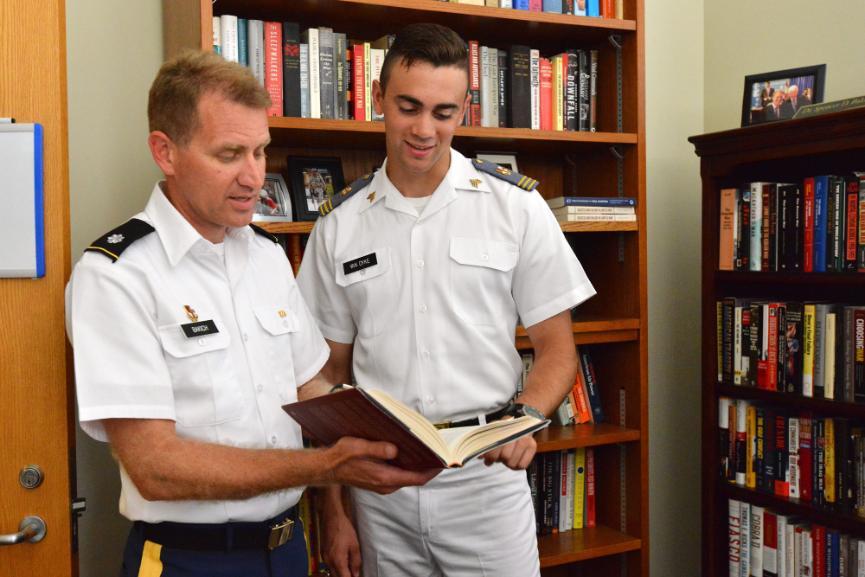‘They Did Things They Weren’t Expecting to Do’

Jacob Van Dyke ’19 confers with Lt. Col. Spencer Bakich about his thesis.—VMI Photo by Mary Price.
LEXINGTON, Va., Oct. 15, 2018—Now in its seventh year of existence, VMI’s national security minor allows a select number of cadets to take on more challenge than the Institute already offers—and almost all of them succeed in spades, despite the requirements of coursework, a thesis, and an internship.
Jacob Van Dyke ’19 is no exception. A first-generation college student, he came to VMI because while he was fairly certain he wanted to commission into the military, he didn’t want to be locked in as he would at the service academies.
Van Dyke came in as a physics major, but switched to international studies before classes began—and before he was even out of the Rat Line, he was studying Japanese on his own. He’d heard about VMI’s exchange program with Japan’s National Defense Academy, and since VMI doesn’t offer classes in Japanese, Van Dyke took the bull by the horns and began preparation on his own, despite the fact that he’d never studied an Asian language before.
The next fall, Van Dyke left the United States for the very first time—and studied abroad at the Japanese National Defense Academy, where all classes are taught in Japanese. As the weeks went by, fear was replaced by confidence as his language skills blossomed and strangers became friends.
“Just all in all, it was a growing experience,” commented Van Dyke, who plans to commission into the Army. “That semester was amazing.”
From the moment he arrived back on U.S. soil, Van Dyke had one ambition: to get back to Japan and keep working on his language skills. This summer, he did just that, studying in Tokyo under the auspices of IES Abroad, a company providing study abroad opportunities to college students. The experience not only gave him the language credits he needed to graduate but also fulfilled his internship requirement for the national security minor.
While in Japan, Van Dyke also undertook a research project under the auspices of the Summer Undergraduate Research Institute. For that project, he interviewed Japanese military personnel about U.S.-Japan relations. He’ll take the information he gleaned from those interviews and use that as the basis for his thesis on the national security culture of Japan.
Van Dyke’s trip to Asia even helped to strengthen the ties between VMI and the Japanese National Defense Academy, as he met up with Col. Howard Sanborn, professor of international studies, and introduced Sanborn to leaders at the Japanese academy.
“We’ve had a really nice relationship with [the Japanese military academy],” said Sanborn, who was making his first trip to the academy. “We want to keep that relationship strong and even build on it …. The driving thing for me is to get cadets to Asia.”
Van Dyke’s experience with the national security minor is far from unique, said Lt. Col. Spencer Bakich, associate professor of international studies and director of the national security minor program.
“This is the stuff that makes for organizational leaders down the line,” said Bakich. “For the type of cadet that’s able to get in, the national security minor is a critical component in their intellectual development. I’ve heard from a number of cadets that their projects were incredibly meaningful to them. They did things they weren’t expecting to do.”
Since its inception, admittance to the minor has been via a competitive selection process and enrollment has been capped at 20 cadets—10 from the 1st Class and 10 from the 2nd Class.
Keeping the minor small is necessary for two reasons, Bakich explained. One, supervising cadet theses takes a lot of faculty time, and two, funds are needed to support cadet internships. Not all of the internships are paid, so there’s an effort made to level the playing field by making sure no cadet is denied an internship due to financial concerns.
The national security minor has been quietly underwritten financially by Louis Blair, who recently retired after many years of serving as the Mary Moody Northen visiting professor in the social sciences. “It’s a pretty special thing he’s done,” said Bakich. “He’s an inspiration.”
Bakich isn’t the only one appreciative of Blair’s altruistic spirit. “The minor would not exist without [Blair’s] generosity and commitment,” said Col. Dennis Foster, head of the Department of International Studies and Political Science.
“It’s a phenomenal program,” said Bakich of the national security minor program. “If there’s one thing I’d love to be able to do, it would be to generate more money for it, because I would love to be able to expand these opportunities for the cadets. I’d love to give cadets more opportunities to do more of these types of things.”
This summer, not only did Van Dyke study abroad in Japan, but another cadet pursuing the national security minor, Kristian Perez, attended the Peace and Security in the South Caucasus program in the Republic of Georgia. Yet another cadet interned in the office of Secretary of Defense Jim Mattis, and still another was an intern at Lockheed Martin. Those cadets, Bakich noted, found these opportunities on their own.
“As in life, very little is given to you,” he remarked. “We work with [the cadets], but they drive the train.”
-Mary Price
-VMI-
.svg)
.png)